“They call them the haunted shores, these stretches of Devonshire and Cornwall and Ireland which rear up against the westward ocean. Mists gather here . . . and sea fog . . . and eerie stories . . . ”—part of the opening narration
A ghost story? No, not the shocker kind, with raised knives gleaming in the candlelight, things jumping out of dark corners. A bloodbath, certainly not. Far more subtle. Rather, a soft, almost poetic ghost story, here in this house in The Uninvited, a story beginning with palpable forebodings, yes, but like a gentle undertow—apt, as the sea can be seen from the windows—with implications, hints that all isn’t completely right, that something’s amiss, that——
And voices? Yes, here are those, too. All ghost stories have voices, but not, in this case, shouts, screams or vengeful threats. Only a gentle sobbing, as if the two visitors to the house, soon-to-be its owners, are intruding, eavesdropping on a sorrow from some unhappy life long gone. Maybe a tip-off that the house would be better left as it is—to remain unoccupied, empty of furniture, forlorn in its isolation above the cliffs, in company with the rocky coast and the sea, the sea whose crashing and murmuring waves can be heard from the house.
The Uninvited was one of the first movies, if not the first, to treat the supernatural intelligently, evident in its restrained screenplay (Dodie Smith and Frank Partos from Dorothy Macardle’s 1942 novel) and in Charles Lang’s Oscar-nominated cinematography. Without the gimmicks so typical of “spooky” films, the camera skillfully establishes an atmospheric link, not only with the house, but with the ebbing and flowing of the Celtic Sea, and with an also romantic placidity. The moody chiaroscuro of blacks and whites add ambiance, not only to the ghostly appearances, and those always not all that scary, but to scenes with the earthly characters—in the first visit to the house, in a study during a séance, in bedrooms at night, on the staircase where much transpires, at the piano.
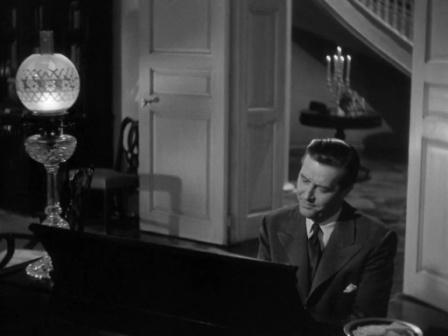 For the piano plays an important role in The Uninvited. At the instrument, the leading character is inspired enough by his feelings for a young lady to write a song, “Stella by Starlight,” started and finished in the film. Hands are never seen playing the piano, probably because the actor couldn’t play the piano, yet through his intense concentration and his eyes on the keyboard, he gives a sincere impression of playing.
For the piano plays an important role in The Uninvited. At the instrument, the leading character is inspired enough by his feelings for a young lady to write a song, “Stella by Starlight,” started and finished in the film. Hands are never seen playing the piano, probably because the actor couldn’t play the piano, yet through his intense concentration and his eyes on the keyboard, he gives a sincere impression of playing.
The melody and the score itself are by Victor Young. With lyrics added by Ned Washington, “Stella by Starlight” became a major hit in the late ’40s for a number of popular singers, and, because of the tune’s sophisticated harmonies, a favorite of jazz musicians for improvisation. The score, like most everything else about this movie, is subtle, never going for the obvious, giving the ghosts—yes, there’re two!—muted musical profiles. (Much of the music is nearly inaudible due to the low level of the music track.)
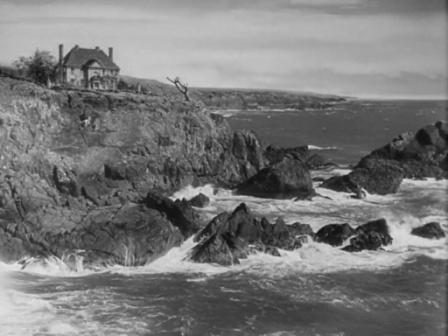 As part of the orchestra, “Stella by Starlight” is first heard in the piano in the main title. The credits given, and accompanied by views of waves crashing on that rocky shore, Roderick “Rick” Fitzgerald’s (Ray Milland) narration follows, concluding with “Well, my sister Pamela and I knew nothing about such [eerie stories]. Not then we didn’t. We had the disadvantage of being Londoners, just down for a fortnight’s rest. That tenth day of May, 1937, was the end of our holiday.”
As part of the orchestra, “Stella by Starlight” is first heard in the piano in the main title. The credits given, and accompanied by views of waves crashing on that rocky shore, Roderick “Rick” Fitzgerald’s (Ray Milland) narration follows, concluding with “Well, my sister Pamela and I knew nothing about such [eerie stories]. Not then we didn’t. We had the disadvantage of being Londoners, just down for a fortnight’s rest. That tenth day of May, 1937, was the end of our holiday.”
Mystery novelists, for example—or any novelists for that matter—usually avoid moving ahead of the story they are about to tell with the portentous, preemptive, sometimes pretentious “had they only known . . . ” or “tragedy was to strike in only a few days . . . ” It’s true that there are some rather good mysteries with this very anticipatory tickle for the reader, and here in The Uninvited the practice is of little consequence. The ghost story that follows is still a good one, forewarned or not. . . .
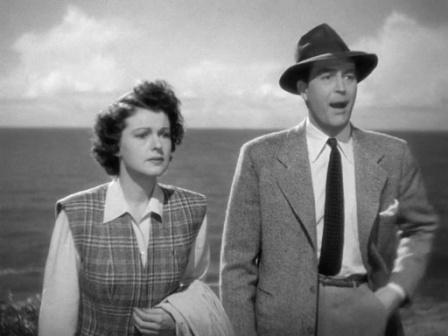 Rick, composer and music critic, and his sister Pamela (Ruth Hussey), vacationing in Cornwall, England, climb up from the sea, perhaps after a walking tour, and find an abandoned two-story manor house. Their dog Bobby chases a squirrel through an open window into the house. His owners follow. Composer Young provides a jaunty, scampering tune, highlighted by the piano, as Bobby chases the squirrel, which escapes up the fireplace chimney.
Rick, composer and music critic, and his sister Pamela (Ruth Hussey), vacationing in Cornwall, England, climb up from the sea, perhaps after a walking tour, and find an abandoned two-story manor house. Their dog Bobby chases a squirrel through an open window into the house. His owners follow. Composer Young provides a jaunty, scampering tune, highlighted by the piano, as Bobby chases the squirrel, which escapes up the fireplace chimney.
The couple take to the house immediately—the large, elaborate rooms, another fireplace in a bedroom, the fancy staircase whose banisters suggest to Rick a good slide—and Pamela proposes they buy it. When visiting a room with a large window facing the sea, Rick whimsically observes, “Light on the ceiling—that’s the [reflection of the] sea.” The door to one room is locked, and Rick jokes that it’s probably hiding some family skeleton.
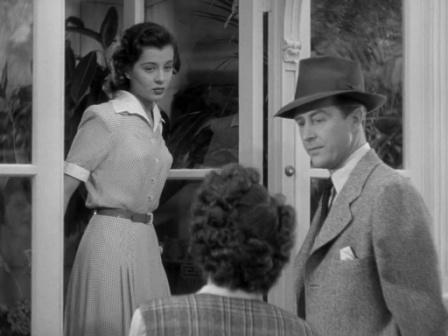 They go to a house in the nearby village of Biddlecombe, are greeted by the friendly, elfin Stella Meredith (Gail Russell, then twenty but looking seventeen). She abruptly turns cold when she learns they want to buy the house. She is suggesting they leave when her grandfather, Commander Beech (Donald Crisp, in something of his stern, How-Green-Was-My-Valley demeanor), arrives and says, definitely, Windward House is for sale.
They go to a house in the nearby village of Biddlecombe, are greeted by the friendly, elfin Stella Meredith (Gail Russell, then twenty but looking seventeen). She abruptly turns cold when she learns they want to buy the house. She is suggesting they leave when her grandfather, Commander Beech (Donald Crisp, in something of his stern, How-Green-Was-My-Valley demeanor), arrives and says, definitely, Windward House is for sale.
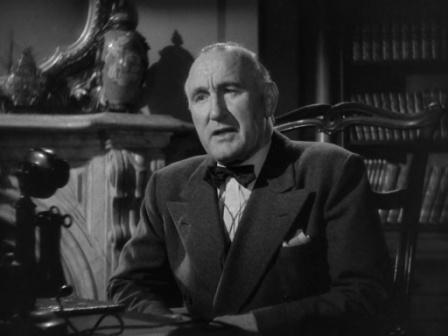 Rick and Pamela bargain briefly with Beech, who settles for £1,200—a ludicrously cheap price for an English manor house, even in the late ’30s. (A script error?) Beech warns that previous tenants have reported “disturbances,” but not to be concerned, for, he assures them, “no house is haunted.”
Rick and Pamela bargain briefly with Beech, who settles for £1,200—a ludicrously cheap price for an English manor house, even in the late ’30s. (A script error?) Beech warns that previous tenants have reported “disturbances,” but not to be concerned, for, he assures them, “no house is haunted.”
Upon reentering the house, Rick has fleeting doubts that they were right in their purchase. After unlocking the door to that previously inaccessible room and finding one wall full of windows open to the sea, he suggests it would make a fine studio. They both notice a sudden chill. “Funny it should strike so cold in here,” Pamela says, “after such a warm day.” A bouquet of flowers she had set behind her on a bench suddenly shrivels—seen only by the camera, not by the couple, and, strangely, never noticed or referred to thereafter. And, oh, there’s that other thing—Bobby won’t go up the staircase.
 Stella, who says her mother, Mary, had died in the house, is nevertheless attached to the place, which the commander has forbidden her to enter. She next meets Rick again, now in the streets of Biddlecombe, and apologizes for her earlier unsociable behavior. Rick is instantly taken with her and rents a sailboat to go sailing. To help assuage his seasickness, she gives him a handkerchief scented with mimosa, her mother’s favorite perfume.
Stella, who says her mother, Mary, had died in the house, is nevertheless attached to the place, which the commander has forbidden her to enter. She next meets Rick again, now in the streets of Biddlecombe, and apologizes for her earlier unsociable behavior. Rick is instantly taken with her and rents a sailboat to go sailing. To help assuage his seasickness, she gives him a handkerchief scented with mimosa, her mother’s favorite perfume.
Beyond the earlier peculiar goings-on, both Rick and Pamela hear a woman’s soft sobs and feel a draft on the staircase landing and smell the fragrance of the mimosa flower. “It comes from everywhere—nowhere,” Pamela says. Rick brings to the house his previous housekeeper, Lizzie (Barbara Everest). Everest, the same year as The Uninvited, plays another housekeeper in the American version of Gaslight (1944). Lizzie will soon be frightened by, as she says, “a mist, a crawling mist . . . the ghost of a woman,” and refuses to remain in the house any longer.
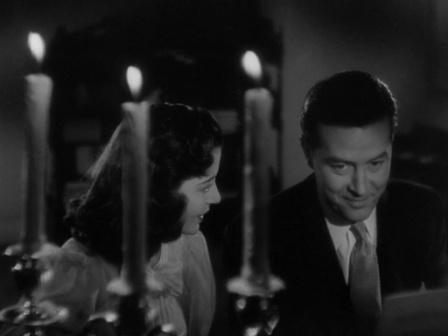 Stella defies her grandfather and visits Windward. On one occasion, she is listening to Rick play the piano. He says the serenade, “Stella by Starlight,” was inspired by her. As the candles on the piano flicker and almost go out, the room darkens, the music as well. “It got awfully sad,” she says. “Why have you changed it?” “It just came out that way,” he replies.
Stella defies her grandfather and visits Windward. On one occasion, she is listening to Rick play the piano. He says the serenade, “Stella by Starlight,” was inspired by her. As the candles on the piano flicker and almost go out, the room darkens, the music as well. “It got awfully sad,” she says. “Why have you changed it?” “It just came out that way,” he replies.
Stella has already said she “communicates” with a portrait of her mother her father had painted, and when she senses the fragrance of mimosa on a visit to Windward, she abruptly rushes from the house toward the cliff from where her mother had fallen to her death. Rick catches her before she falls and Stella is put to bed.
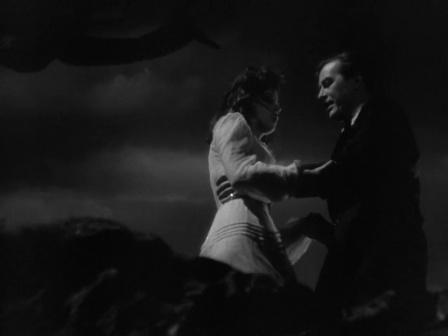 From village physician Dr. Scott (Alan Napier), Rick and Pamela learn that Stella’s father had had an affair with his model, a Spanish gypsy named Carmel. When Mary learned of the affair, Carmel was sent away to Paris, the infant Stella remaining behind. Later, Carmel returned and stole the child. After a struggle between Carmel and Mary on the cliff, Mary fell to her death under suspicious circumstances. Suicide? Murder? Soon after, Carmel became ill and died. This was seventeen years ago.
From village physician Dr. Scott (Alan Napier), Rick and Pamela learn that Stella’s father had had an affair with his model, a Spanish gypsy named Carmel. When Mary learned of the affair, Carmel was sent away to Paris, the infant Stella remaining behind. Later, Carmel returned and stole the child. After a struggle between Carmel and Mary on the cliff, Mary fell to her death under suspicious circumstances. Suicide? Murder? Soon after, Carmel became ill and died. This was seventeen years ago.
Feeling that Stella’s attraction to Windward is dangerous, Rick stages a séance, hoping the ghost of Mary will urge her daughter to leave. Instead, through an improvised ouija board, the ghost conveys to Stella that it is here to protect her, but the young girl begins speaking in Spanish. Is it Carmel? Now there are two ghosts, Rick says.
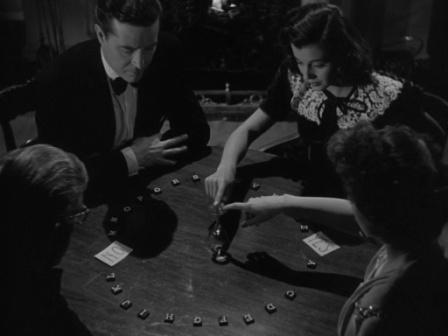 Commander Beech has Stella committed to the Mary Meredith Retreat, run by Miss Holloway (Cornelia Otis Skinner), a Mrs. Danvers-like creature—dressed in black as well—whose devotion to Mary, like the Rebecca (1949) maid’s devotion to her mistress, suggests lesbian overtones. This is never directly stated, only implied for the paying-attention viewer, this being 1944, after all!
Commander Beech has Stella committed to the Mary Meredith Retreat, run by Miss Holloway (Cornelia Otis Skinner), a Mrs. Danvers-like creature—dressed in black as well—whose devotion to Mary, like the Rebecca (1949) maid’s devotion to her mistress, suggests lesbian overtones. This is never directly stated, only implied for the paying-attention viewer, this being 1944, after all!
Dr. Scott’s journal reveals that Holloway may have caused Carmel’s death, and while Scott is attending an ailing Beech, the woman deceives Stella, telling her Rick and Pamela want her to live with them. Holloway releases her and Stella returns to Windward House. There she finds her grandfather, who begs her to leave the place, and when the ghost appears again, he dies from a heart attack.
(Of possible interest: While on a visit to the retreat to confront Miss Holloway, Rick and Pamela accidentally meet a patient, Miss Bird [Dorothy Stickney], whose wispy scurrying and kookiness recall a similarly choreographed and flighty Harriet Stanley [Ruth Vivian] in The Man Who Came to Dinner [1942]. Both composers of their respective scores—Friedrich Hollander scored Dinner—provide appropriately lively, dainty music.)
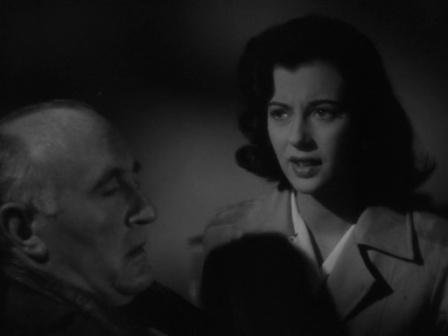 Believing the ghost to be her mother, Stella welcomes the specter, but she becomes frightened and flees once again toward the cliff. Rick and Dr. Scott arrived in time to rescue her before she falls from the edge.
Believing the ghost to be her mother, Stella welcomes the specter, but she becomes frightened and flees once again toward the cliff. Rick and Dr. Scott arrived in time to rescue her before she falls from the edge.
In the house, Rick is consulting Dr. Scott’s journal when, as if from a breeze, the pages turn to a certain passage that reveals Carmel is Stella’s actual mother. Now that Stella has learned the truth, Carmel’s spirit is free to leave Windward, and the fragrance of mimosa disappears as well.
But there’s that other ghost! On the staircase, Rick tells the spirit of Mary Meredith that no one is afraid of her, that she has no power any longer. He throws the lit candelabrum at her, and she is gone. Dr. Scott announces he plans to marry Pamela, and Rick tells Stella that he’s glad Mary Meredith will not be his mother-in-law.
 Although receiving top billing, Ray Milland is not the standout in The Uninvited, not that any one is; rather the success of the film is thanks to fine performances by a diverse ensemble of players. If any actors should be singled out, they are Donald Crisp, always reliable in whatever he does, and Gail Russell, listed in the credits as “introducing . . . ,” though this was, in fact, her third film to be released. She brings a girlish, light air to her acting, totally charming.
Although receiving top billing, Ray Milland is not the standout in The Uninvited, not that any one is; rather the success of the film is thanks to fine performances by a diverse ensemble of players. If any actors should be singled out, they are Donald Crisp, always reliable in whatever he does, and Gail Russell, listed in the credits as “introducing . . . ,” though this was, in fact, her third film to be released. She brings a girlish, light air to her acting, totally charming.
Russell suffered from severe cases of stage fright that recall Jean Arthur. Russell countered her problem with drinking that led, eventually, to alcoholism, arrests for drunken driving and death at the age of thirty-six, alone in her apartment, surrounded by empty liquor bottles. Arthur, by contrast, lived to be ninety, vacated Hollywood for the last twenty-five years of her life, taught at Vassar and North Carolina School of the Arts and enjoyed feeding her cats.
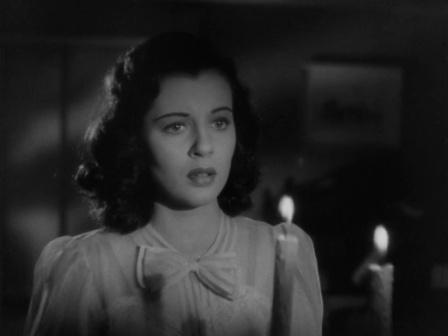 In the usual mode for this point in his career, Milland in The Uninvited is the light, easygoing, man-about-town—confident as well as competent, suiting well his part and enjoyable to watch. Hard to believe he was only four films away from his Oscar-winning Best Actor role as alcoholic Don Birnam in The Lost Weekend, a decided departure. The Billy Wilder film was an anomaly, as it was unexpected and such a demanding role would never be Milland’s luck, to that degree, again.
In the usual mode for this point in his career, Milland in The Uninvited is the light, easygoing, man-about-town—confident as well as competent, suiting well his part and enjoyable to watch. Hard to believe he was only four films away from his Oscar-winning Best Actor role as alcoholic Don Birnam in The Lost Weekend, a decided departure. The Billy Wilder film was an anomaly, as it was unexpected and such a demanding role would never be Milland’s luck, to that degree, again.
His movies of the ’30s and pre-Weekend are largely undistinguished, his roles as well. He has a small part in Bette Davis’ The Man Who Played God (1932) and one go-round as the private eye in Bulldog Drummond Escapes (1937). After Weekend, the earlier trend resumes, one exception being Dial M for Murder (1954), Alfred Hitchcock’s exercise, as with Joseph Cotton in Shadow of a Doubt (1943), that murderers could be—maybe should be—attractive and debonair. Thereafter it is mostly TV, marked by The Ray Milland Show (1953-55) and Markham (1959-60), then the inevitable slow descent typical of so many long-career stars—in his case almost sixty years. He hits a near-“bottom” with the film X: The Man With X-Ray Eyes (1963).
 Born six years after Milland, Ruth Hussey, who had a similar career, is now nearly forgotten. From an M-G-M “B” actress and a string of run-of-the-mill films in the ’30s, she peaked in The Philadelphia Story (1940), receiving an Oscar nomination for Best Supporting Actress as the sardonic news photographer. Unlike Milland, who worked until the end, and more like Jean Arthur, Hussey retired from the movies and lived another thirty-two years.
Born six years after Milland, Ruth Hussey, who had a similar career, is now nearly forgotten. From an M-G-M “B” actress and a string of run-of-the-mill films in the ’30s, she peaked in The Philadelphia Story (1940), receiving an Oscar nomination for Best Supporting Actress as the sardonic news photographer. Unlike Milland, who worked until the end, and more like Jean Arthur, Hussey retired from the movies and lived another thirty-two years.
